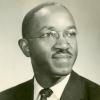The Court Speaketh, But What Dost It Say?
Cobbloviate
In another outrageous display of blatant disrespect, the Supreme Court has shown the temerity to issue two key rulings while the Ol' Bloviator and the Ms. were sipping umbrella drinks down in the tropics. Mucho profundity has been disseminated about the Court absolutely nuking the Defense of Marriage Act (U.S. v. Windsor and effectively neutering the Voting Rights Act Shelby County v. Holder), but all of you should know by now that the O.B. couldn't care less about what anybody else says.
On the face of it, both decisions, one deemed "conservative" and one "liberal," seem to represent a victory for state' rights. The Voting Rights decree removes the "preclearance" provision requiring prior Justice Department approval of changes in registration and voting requirements and procedures in the nine historically discriminatory states covered by Section 4 of the old law. Likewise, the invalidation of the 1996 "Defense of Marriage Act" (which imposed a congressional definition of marriage as a purely heterosexual union) reaffirms what, writing for the five-vote majority, Justice Anthony Kennedy called "the unquestioned authority of the states" to determine the legal requirements for marriage within their boundaries.
As has been its wont, however, in both cases the Court has left some contingencies and ambiguities dangling here and there. In rejecting the current body of documentation of voter discrimination (which actually dates back to the mid-1970s) on which the preclearance requirement was premised, the five majority justices have suggested, albeit rather half-heartedly, that Congress may be able to reimpose preclearance by grounding it in more relevant contemporary evidence of racial discrimination or deliberate attempts to dilute minority voting strength in a state's electoral practices. So long as the GOP retains control of the House, the likelihood that Congress would actually follow the Court's suggestion is roughly equivalent to that of Mitt Romney rocking a mullet in Salt Lake City, but if it did, the geography of preclearance would likely change noticeably, and appropriately so.
Reducing minority turnout in presidential elections is not currently an urgent Republican priority in most southern states, save for the new "swing states" of Virginia, Florida, and perhaps North Carolina, two of which have swung against them twice in eight years. On the other hand, before the Repubs can even hope to put one of their own in the White House again, they will have to break at least a chunk or two off the 18-state, 246 -electoral vote bloc that the Dems have swept in the last six presidential elections, and improve their odds in one-time battleground states like Pennsylvania, Michigan and Wisconsin where not coincidentally, one suspects, GOP'ers suddenly want their state's electoral votes to be awarded on the basis of how candidates fare in each congressional district. (This system would have given Romney 29 of their combined 46 electoral votes, all of which went to Obama the last time out.)
The Republicans are in a position to push such stratagems by virtue of their legislative strength in several states where there has been a critical disconnect between state and presidential politics of late. Although the Court left intact Section 2 of the Voting Rights Act, which bans any voting procedures that deny "a racial or language minority an opportunity to take part in the political process," by effectively neutering the preclearance requirement, it appeared to signal that protecting minority voting rights is no longer a judicial priority. (Literally within hours of the ruling, Texas officials were moving to implement a photo identification requirement previously found to be discriminatory by a lower court.) In reality, however, this decision may have its most immediate effect at the local level. Switching from single-district to at-large elections for city councils or county commissions in places where geographically concentrated minority populations are not large enough to prevail against solid white majorities can change the electoral landscape dramatically overnight, especially when voting patterns are still so sharply polarized by race.
In her unusually strong dissent to the majority opinion, Justice Ruth Bader Ginsburg made a powerful case that relative turnout or registration should not be the primary indicator of whether voter discrimination is either a reality or a strong probability. Quoting recent scholarship on the effects of racially polarized voting, Ginsburg noted that "when political preferences fall along racial lines, the natural inclinations of incumbents and ruling parties to entrench themselves have predictable racial effects. In other words, a governing political coalition has an incentive to prevent changes in the existing balance of voting power. When voting is racially polarized, efforts by the ruling party to pursue that incentive "will inevitably discriminate against a racial group."Thus, Ginsburg analogizes," just as buildings in California have a greater need to be earthquake proofed, places where there is greater racial polarization in voting have a greater need for prophylactic measures to prevent purposeful race discrimination."
The O.B. isn't quite sure what condoms have to do with protecting minority voting rights, but as the invalidation of DOMA indicates, sex has clearly been much on the Court's mind recently. In the short run, this ruling seems to be a boon to supporters of gay marriage, in the sense that it removes a potentially contravening federal statute, and paves the way for so-inclined states like California to legalize gay and lesbian unions. In the short run as well, the ruling clears the way for gay and lesbian couples in states where their marriages are legal to receive the same federal spousal benefits as other married people. What the Court left unresolved, however, was whether a state where gay marriage is not legally sanctioned is required to recognize such a union made in a state where it is. (This, of course, would circle back to the question of eligibility for federal benefits.)
In states where there is still strong opposition to legalizing gay marriage, the Court's ruling would seem to have to have little immediate bearing, but the long view is a little fuzzier thanks to Justice Kennedy's somewhat muddled and contorted majority opinion. Not only did Kennedy declare that the objectionable "essence" of DOMA lay in its "interference with the equal dignity of same-sex marriages, . . . conferred by the States in the exercise of their sovereign power," but he cited a House document indicating that the law was grounded in "both moral disapproval of homosexuality, and a moral conviction that heterosexuality better comports with traditional (especially Judeo-Christian) morality." To Kennedy, this meant that the "avowed purpose and practical effect of the law here in question are to impose a disadvantage, a separate status, and so a stigma upon all who enter into same-sex marriages," thus depriving them of their Fifth Amendment rights to due process and equal protection of the law.
Although Kennedy insisted that the majority opinion was limited specifically to defending the sanctity of gay marriages granted in states where their legality is already recognized, if a desire to stigmatize gay and lesbian relationships is grounds for striking down an act of Congress, the odious (but certainly not stupid) dissenting Justice Antonin Scalia has a point when he asks why the same principle would not apply to a state law banning gay marriage. Unless the five justices in the majority in this decision are ready to risk whiplash in an abrupt "about face" on asserting that the prerogative to set the legal requirements for marriage resides with the states, however, Scalia is largely fear mongering when he implies that such a move is by any means imminent.
For now, the future of legalized gay marriages lies where the Court has placed it, in the hands of the states. A new Pew Foundation poll showing that for the first time a majority (actually 51 percent) of Americans now favor legalizing gay marriage is clearly encouraging to supporters. Yet the state-by-state shakeout of opinion on the subject is really the crucial consideration here, and the percentages who say they support or oppose legalizing gay marriage give no indication of how intense those feelings might be in either direction or how faithfully their percentages might be represented in the legislature of a given state. Some 56 percent, for example, continue to view same-sex marriage as incompatible with their own religious beliefs. The Pew poll actually suggest that 72 percent of Americans (including 59 percent of those who oppose it) now believe legally recognized gay marriage is inevitable in the United States, but we are still likely to witness a great deal of conflict, most of it beyond the reach of the courts and some of it not very pretty, before their highest hopes or gravest fears are realized.
More by James C. Cobb
-

-

When Historians Made History Themselves
Cobbloviate
-










comments